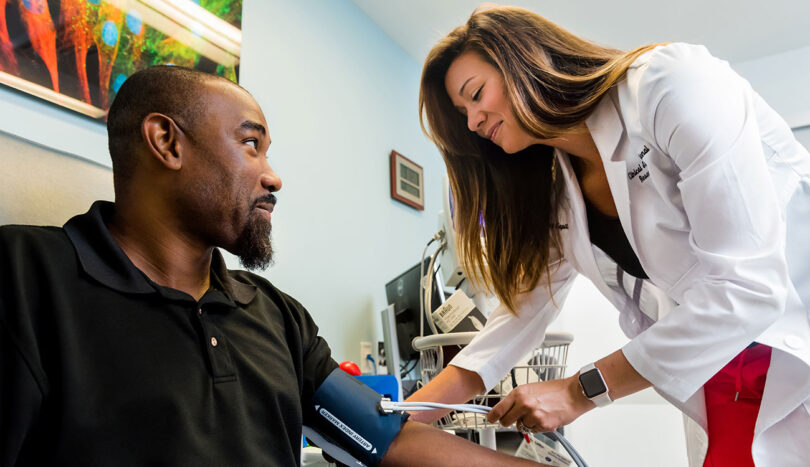The National Institutes of Health has awarded $58.6 million over the next five years to the Georgia Clinical & Translational Science Alliance (CTSA), a consortium of universities and healthcare providers that includes UGA, to continue its efforts to transform medical research into results that improve the health of people in Georgia and beyond. In addition to NIH funding, the Georgia CTSA will receive $15.1 million in support from its academic institutions.

Georgia CTSA principal investigators include (left to right) Henry Blumberg, Emory University; Bradley Phillips, UGA; Elizabeth Ofili, Morehouse School of Medicine; Andrés García, Georgia Tech; and Robert Taylor (contact principal investigator), Emory University. (Submitted photo)
“As in so many industries, Georgia is proud to lead the way in developing healthcare solutions that improve outcomes for all,” said Georgia Gov. Brian Kemp. “This funding award is just the latest recognition of the importance and cutting-edge position of the Georgia Clinical & Translational Science Alliance. I want to congratulate its members on this achievement and the positive impact it will have across our state and far beyond.”
Georgia CTSA accelerates clinical and translational education, research, workforce development, and community engagement. Its member institutions include UGA, Emory University, Morehouse School of Medicine and Georgia Tech.
“The Georgia CTSA has achieved so many great milestones in research, outreach, education and workforce development” said Brad Phillips, director of the UGA Biomedical and Translational Sciences Institute and UGA principal investigator for the Georgia CTSA. “We have provided pilot research awards to over 10 faculty. We’ve also awarded mentored training grants to a diverse group of UGA predoctoral students and to junior faculty for careers in clinical and translation science. The majority of faculty who have finished the program have gone on to secure federal funding for their own research.”
Faculty, staff and students from across UGA contribute to the success of Georgia CTSA by leading its various initiatives. To highlight a few:
- The Mary Frances Early College of Education leads workforce development and has created an app, “eMPACT,” to help guide young faculty and students toward purposeful career advancement and training.
- The College of Family and Consumer Sciences leads community-engaged research through Georgia Extension, reaching all of the state’s 159 counties.
- The College of Pharmacy and School of Social Work collaborate with UGA’s Archway Partnership to address health disparities in Archway communities.
- UGA’s Clinical and Translational Research Unit provides hands-on training for students and the expertise and infrastructure for UGA faculty to conduct clinical trials in Athens as well as across the state through Georgia CTSA.
- As part of the CTSA One Health consortium, the College of Veterinary Medicine leads research, education and outreach on campus and across the country to optimize health of humans and animals.
- The College of Public Health leads on-campus Georgia CTSA support for faculty and students in biostatistics and research design.
- The Owens Institute for Behavioral Research leads engagement and recognition of UGA faculty in forming collaborative multidisciplinary research teams to address health priorities in the state.
As the only NIH-funded Clinical and Translational Science Award in the state, Georgia CTSA has served as a hub for innovation and scientific discovery across Georgia and the Southeast since its inception in 2007. This latest funding award will allow researchers to continue providing support and new tools in bioinformatics and biostatistics, piloting grants to fuel new research, and helping to train the next generation of clinical and translational science investigators.
To ensure Georgia CTSA’s emphasis on improving treatments reaches the communities and populations at highest risk for poor health outcomes, Georgia CTSA will establish its central theme aimed at addressing health disparities amplified by the COVID-19 pandemic. Health equity will be incorporated as a core component of all Georgia CTSA’s proposed work over the next five years.
“Our stated goal of enhancing health equity across the state of Georgia will require a sustained effort to address diversity and inclusivity in collaborating with impacted communities, and mentoring diverse early-stage investigators across the Georgia CTSA,” said Elizabeth Ofili, professor and principal investigator at Morehouse School of Medicine.
One example of how Georgia CTSA can leverage its resources to advance health equity is by creating opportunities to increase representation of ethnic or racial minority groups in clinical trials and other clinical studies. Its Integrating Special Populations program focuses on extending research testing and discovery to all populations in Georgia, with emphasis on rural health concerns. These types of measures can advance health equity, but more will need to be done to sustain progress.
“We are thrilled to continue our innovative and impactful partnership accelerating clinical and translational education, research and community engagement with a focus on enhancing health equity across Georgia and addressing the needs of the rural, poor and underserved populations statewide,” said Andrés García, Regents’ Professor and principal investigator at Georgia Tech.
Over the next five years, Georgia CTSA plans to build on the impact it has already made on statewide research efforts. Through the first four funding cycles, the alliance has awarded 472 pilot grants, contributed to more than 4,000 scientific publications, and assisted over 2,500 investigators.
Additionally, Georgia CTSA will address the critical need to train a new generation of clinical and translational science investigators. Trainees will be equipped to lead scientific teams that are urgently needed to generate new discoveries and translate those discoveries from the laboratory to the bedside and into the community to improve health for all, including underrepresented communities. These mentored research training activities are supported by the KL2 and TL1 research training components of the Georgia CTSA.
“The renewal of the Georgia CTSA provides critical support for our institutional alliance as we work together to tackle the major health issues facing the citizens of Georgia,” said Robert Taylor, professor and contact principal investigator at Emory. “We will continue our focus on reducing the tragic health disparities that exist across our state.”
Georgia CTSA is one of more than 60 CTSA program hubs at medical research institutions across the country supported by the NIH National Center for Advancing Translational Sciences.








